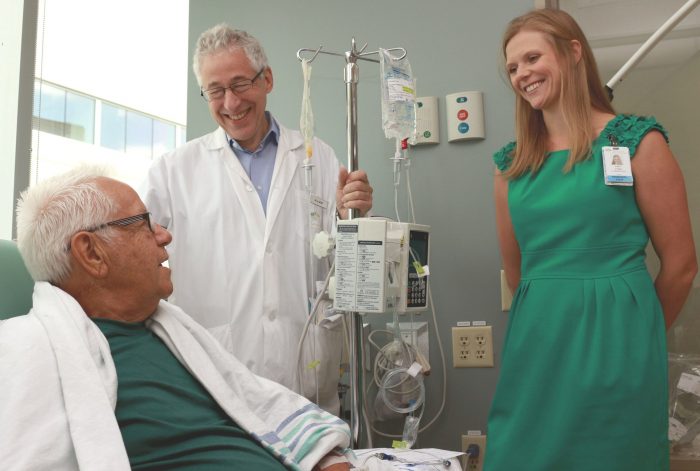Source: JGH
The Segal Cancer Centre at the JGH, an international leader in cancer care and research, has responded to the challenge of the coronavirus (COVID-19) pandemic with compassion and innovation.
Since cancer patients are more vulnerable to severe COVID-19 infection, the first priority has been to limit the number who have to come to the hospital. Whenever possible, patients are being given the opportunity to participate in video consultations with their oncologist as an alternative to face-to-face meetings. The move of the Centre to electronic health records has also greatly facilitated the transition that allows physicians to work remotely.
For those who must be seen in the clinic, appointments are staggered, in order to keep time in reception areas to an absolute minimum. All of the norms of social distancing are strictly enforced and patients are screened for COVID-19 when they arrive at the Centre.
“Thanks to the adjustments that we have implemented, we have maintained the capacity to treat all our cancer patients safely,” emphasizes Dr. Gerald Batist, Director of the Segal Cancer Centre.
“Congratulations go to our exceptional nurses, who are innovating and supporting our patients as we experience this new reality.”
Cancer patients who are COVID-positive must have their treatments stopped until they recover, according to a directive from the Ministry of Health and Social Services. This is because of uncertainty about the interactions between cancer therapies and the virus.
These patients are monitored remotely via a virtual clinic that offers personalized attention, using telehealth technologies. Nurse navigators in Oncology contact these patients daily via Zoom to assist in managing symptoms and to offer timely interventions, in case of changes to the patient’s condition.
“We mustn’t underestimate the supportive nature of these contacts, given the patient’s general isolation,” stresses Erin Cook, Co-Director (Operations) and Clinical Administrative Coordinator at the Segal Cancer Centre. “The patients feel secure that they are being closely monitored and that their well-being is continually assured.”
The JGH is a partner institution in an international consortium conducting research on COVID-19 and cancer. Along with 80 other cancer centres, it will study the effects of the coronavirus on cancer and vice versa. The first publication on the baseline registry is forthcoming.
“This is incredibly important,” says Dr. Batist, “because we need more data on what types of cancers are most affected by COVID-19, at what stage, and whether particular therapies affect the patient’s response. This international registry will help answer these pressing questions.”
The Segal Cancer Centre’s Clinical Research Unit is participating in a passive immunization trial to determine whether plasma from coronavirus patients who have recovered can be used to help hospitalized patients. Dr. Sarit Assouline, a hemato-oncologist, is leading this effort.
“Because our hospital has been ahead of the curve as a leader in digital health, our adaptation to the pandemic was fairly smooth,” said Ms. Cook, “and the pandemic, in turn, has accelerated our transition to digital health. When this is all over, I expect that we’ll be able to incorporate what we’ve learned to change how we operate and to better the patient experience.”
May 13 2020

